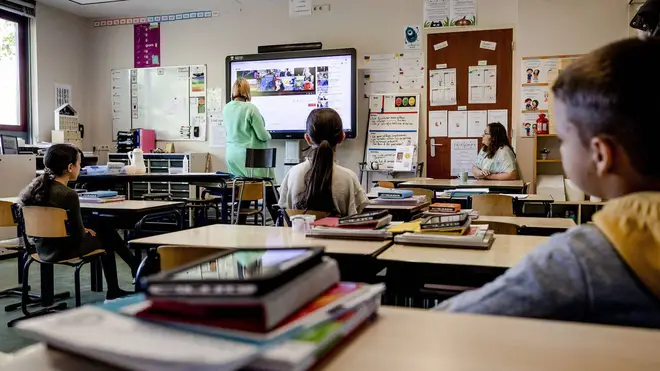
Richard Spurr 1am - 4am
16 June 2020, 06:22

Two million children have done little or no schoolwork at home during lockdown, according to a report that shows the impact of coronavirus school closures.
The National Foundation for Educational Research (NFER) study found a third of pupils had not engaged with lessons during the coronavirus lockdown, fewer than half (42 per cent) had bothered to return their work, and pupils in the most disadvantaged schools were the least likely to be engaged with remote learning.
A Government spokesperson said they will do "whatever we can to make sure no child, whatever their background, falls behind as a result of coronavirus."
A separate study by University College London (UCL) found that a fifth of the UK's ten million schoolchildren had done no work at home or less than an hour a day.
With concerns raised over learning implications for children during the lockdown 90 per cent of teachers said pupils were doing much less work than they would expect at this time of year.
More than half, 55 per cent, of parents are engaged with home learning, teachers reported, but engagement is lower (48 per cent) among parents with secondary school students.

New Rickstones Academy school's plans for returning students
The NFER report, based on a survey of more than 3,000 teachers and heads, found limited access to IT is a "significant challenge", with staff reporting around a quarter of pupils have little or no IT access at home.
It comes as secondary schools in England have begun offering some face-to-face contact for pupils in Year 10 and Year 12 this week ahead of their exams.
Updated Government guidance says secondary schools can now invite students in other year groups for one face-to-face meeting before summer.
Teachers in the most deprived schools reported 30% of pupils returning work, compared with 49 per cent in the least deprived schools.
They were also more likely to report that parental engagement is significantly lower, at 41 per cent, compared with 62 per cent in the least deprived schools.
The poll, of 1,233 heads and 1,821 teachers in England, was carried out in May, when schools were open to vulnerable pupils and children of key workers.
Listen & subscribe: Global Player | Apple Podcasts | Google Podcasts | Spotify
The NFER report said it is "critical" to get disadvantaged pupils, and pupils in the most disadvantaged schools, back to school "as soon as it is safe to do so".
It added: "There is a strong case for extending the Government's scheme to fund digital provision for disadvantaged Year 10 and vulnerable pupils to other year groups."
Carole Willis, chief executive at NFER, said: "There are considerable differences in the levels of pupil engagement in remote learning, particularly amongst the most disadvantaged pupils.
"This supports a growing evidence base highlighting the risk of the attainment gap widening as a result of this pandemic. There is a pressing need for a comprehensive and long-term plan to address this issue."
Josh Hillman, director of education at the Nuffield Foundation, which funded the NFER report, said: "The Government needs to ensure that all students have access to appropriate technology in their homes, and that teachers are fully supported in the coming months in addressing the disadvantage gap that is inevitably continuing to widen during the extended lockdown period."
Paul Whiteman, general secretary of school leaders' union NAHT, said: "Disruption to full-time education could continue for some time yet. It cannot be right that some children miss out on part of their education for want of a computer.
"It is essential that the Government act now to provide internet access and technology to the 700,000-plus children from disadvantaged backgrounds without a computer or connectivity, and close the digital divide."
A Department for Education spokesman said: "We will do whatever we can to make sure no child, whatever their background, falls behind as a result of coronavirus.
"The Government has already committed over £100 million to support children to learn at home, and pupil premium funding at the highest ever rate per pupil continues to be paid to help schools support their disadvantaged pupils.
"Many schools have begun welcoming children from Reception, Year 1 and Year 6 back to the classroom as part of a phased and cautious approach.
"We are also considering, with a range of partner organisations, what more is required to support all pupils who have been affected by school closures."